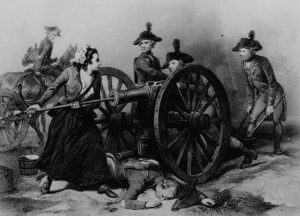 Molly Pitcher at the Battle of Monmouth, June 1778. Copy of engraving by J. C. Armytage after Alonzo Chappel. Courtesy of NARA
Molly Pitcher at the Battle of Monmouth, June 1778. Copy of engraving by J. C. Armytage after Alonzo Chappel. Courtesy of NARA
I recently stumbled upon a reference to Molly Pitcher, a woman from Pennsylvania who fought with her husband during the Revolutionary War for a New Jersey militia unit, and whom New Jersey has adopted as their own heroine of the war, lifting her to almost cult status. Who was this legendary woman? Was she a real woman who fought in the war?
In Emily J. Teipe’s 1999 article “Will the Real Molly Pitcher Please Stand Up?” in Prologue Magazine, she cites Robert Leckie’s text,[1] which states that Molly Pitcher was actually Mary Ludwig Hayes, a daughter of German immigrants, who fought alongside her husband, John Hayes, in Captain Francis Proctor’s company in the Pennsylvania Artillery.[2]
"[She] smoked and chewed tobacco and swore as well as any of the male soldiers"
She was described as a “twenty-two-year-old illiterate pregnant woman who smoked and chewed tobacco and swore as well as any of the male soldiers.”[3] Mary Ludwig Hayes has an official Revolutionary War record, participated in the Battle of Monmouth, supplied exhausted soldiers with drinking water (earning the name “Molly Pitcher”), reportedly received thanks directly from General George Washington, and collected an annual pension of forty dollars from the State of Pennsylvania for her military actions.[4] Mary Ludwig Hayes seems like an excellent candidate to be the real Molly Pitcher, and Teipe’s research proves that women certainly did perform outstanding duties in battle during the Revolutionary War.[5]
Many additional texts, including William Henry Egle’s Some Pennsylvania Women During the War of the Revolution, state that a woman named Margaret (Cochran) Corbin, daughter of Robert Cochran and wife of John Corbin, enlisted in Captain Francis Proctor’s company in the Pennsylvania Artillery along with her husband.[6] Margaret Corbin was officially recognized by the Board of War, and received disability pay for her services, much the same as Mary Ludwig Hayes.
[a] high voice and girlish complexion
Emily J. Teipe introduces a third possibility to the search for Molly Pitcher’s true identity: Deborah Sampson.[7] Deborah disguised herself as a man and signed up to fight with the Fourth Massachusetts Regiment, where she was nicknamed “Molly” because of her high voice and girlish complexion. She received a Federal pension for her service, and after the war married Benjamin Garrett at Sharon, Massachusetts, in 1784, eventually giving birth to three children: Earl, Gilbert, and Patience.[8] Deborah Sampson is yet another candidate to be “Molly Pitcher.”
Thanks to Teipe’s previous research, along with additional texts, it seems that “Molly Pitcher” may have been a mythic concoction of multiple heroic women who officially served during the Revolutionary War. There are few examples of women actually receiving state and federal pensions, but it is widely known that a considerable number of women gave wounded soldiers care, food, and water at their homes during the war. There may have been countless others who fought in the Revolutionary War about whom we don’t yet know.
Notes
[1] George Washington's War: The Saga of the American Revolution (New York: Harper Collins, 1992), 486.
[2] Emily J. Teipe, “Will the Real Molly Pitcher Please Stand Up?” Prologue Magazine 31: 2 [1999], as seen on the National Archives Website, http://www.archives.gov/publications/prologue/1999/summer/pitcher.html#f1.
[3] Ibid.
[4] Ibid.
[5] See also the illustration above. ARC Identifier: 532935; The George Washington Bicentennial Commission, 1931–1932; Records of Commissions of the Legislative Branch, 1928–2006; Record Group 148; National Archives and Records Administration, as viewed on the National Archives Website, http://www.archives.gov/global-pages/larger-image.html?i=/publications/prologue/1999/summer/images/rev-war-molly-pitcher-l.jpg&c=/publications/prologue/1999/summer/images/rev-war-molly-pitcher.caption.html.
[6] William Henry Egle, M.D., Some Pennsylvania Women During the War of the Revolution (Harrisburg, Pa: Harrisburg Publishing Company, 1898), 52.
[7] Teipe, “Will the Real Molly Pitcher Please Stand Up?” Prologue Magazine 31: 2 [1999].
[8] Ibid.
Share this:
About Andrew Krea
Andrew Krea holds a B.A. in English Literature from Brandeis University, in Waltham, Massachusetts, and a Master’s Degree in Library Science from Simmons College in Boston, Massachusetts. He has previously interned at the Massachusetts Historical Society. His areas of interest and expertise include New England research, specifically genealogies dating back to the inception of the Massachusetts Bay Colony, and researching and writing historical narratives of family genealogies.View all posts by Andrew Krea →